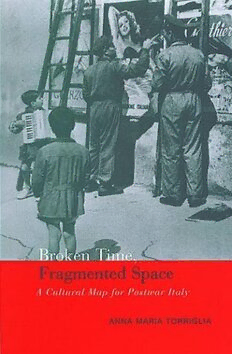
Broken Time, Fragmented Space: A Cultural Map of Postwar Italy PDF
Preview Broken Time, Fragmented Space: A Cultural Map of Postwar Italy
h A Cultural Map for Postwar Italy This page intentionally left blank BROKEN TIME, FRAGMENTED SPACE A Cultural Map for Postwar Italy Anna Maria Tomglia UNIVERSITY OF TORONTO PRESS Toronto Buffalo London www.utppublishing.com University of Toronto Press Incorporated 2002 Toronto Buffalo London Printed in Canada ISBN O-8O2O-36O4-X Printed on acid-free paper Toronto Italian Studies National Library of Canada Cataloguing in Publication Data Torriglia, Anna Maria Broken time, fragmented space : a cultural map for postwar Italy (Toronto Italian studies) Includes bibliographical references and index. ISBN O-8O2O-36O4-X 1. Italy - Social life and customs - 1945- 2. Italy - Intellectual life - 2Oth century. I. Title. II. Series. DG451.T67 2OO2 945-O92 02001-903102-5 University of Toronto Press acknowledges the financial assistance to its publishing program of the Canada Council for the Arts and the Ontario Arts Council. University of Toronto Press acknowledges the financial support for its publishing activities of the Government of Canada through the Book Publishing Industry Development Program (BPIDP). For the women of my family: Maria Luisa, Giampaola, Cinzia, and Surur Eloisa This page intentionally left blank CONTENTS Preface ix Acknowledgments xxi 1 Time Has Changed 3 The Uneasy Relationship with the Past in the Postwar Period 3 A Fatherless Generation: Pietro Germi's Gioventu perduta 15 A Hero Astray: Vasco Pratolini's Un eroe del nostro tempo 22 The Suicide of the Future: Rossellini's Germania anno zero 30 2 From Mother to Daughter 39 The Emergence of a Female Genealogy 39 The War as Emotional Setting: Anna Band's Artemisia 42 Female Solidarity: Alba de Cespedes's Dalla parte di lei 49 Cinema Rediscovers Women 58 'La' Magnani, or about Motherhood and Visconti's Bellissima 66 3 The Myth of America 79 The Antecedent 79 Revisionism at Work: Cesare Pavese and Giuseppe De Santis 86 The Rossellini-Bergman Affair: Stromboli terra di Dio 96 The Lost Train of Cultural Blending: De Sica's Stazione Termini 101 The Myth Is Over: Pavese's La luna e ifalo 109 viii Contents 4 The Country at Hand 117 The Journey 117 The South: Ernesto De Martino and Rocco Scotellaro 121 Naples: Ortese's // mare non bagna Napoli and Rossellini's Viaggio in Italia 127 Toward a Postmodernist Paradigm: Antonioni's Le amiche 141 Conclusions 149 Notes 157 Bibliography 215 Index 231 PREFACE For the critic must attempt to fully realize, and take responsibility for, the unspoken, unrepresented pasts that haunt the historical present. HOMIBHABHA In May 2OOO the historian Angelo d'Orsi, who teaches History of Politi- cal Thought at the University of Turin, published a book entitled La cultura a Torino tra le due guerre.1 The volume represents the final achievement of twenty years of study, and its findings are well docu- mented and quite exhaustive. In a few instances they had been antici- pated and discussed in previous articles by the same author. As the title suggests, the book - based on archival research and on oral interviews alike - analyses the cultural climate prevailing in Turin between the two world wars, and it does so by being quite specific and detailed, and by falling, at times, into a perhaps much too accurate microhistory. It con- siders the public school system, and in particular the famous Liceo Monti attended by a generation of anti-Fascists-to-be, the Publishing House Einaudi, and some of the most influential intellectuals of the times, including Monti, Gobetti, Ginzburg, and Bobbio. It also examines Catholic groups, or the early Fascist ones, and the artistic life of the city - theatres, exhibits, newspapers, and the like. There is nothing strange up to here. It is the job of academics - as it is painfully known - to publish books. The problem begins with the debate that d'Orsi's book elicited among other scholars, politicians, and journalists.2 Most of them wrote controversial, polemic reviews of the volume, often labelling it as revisionista, a derogatory adjective used in
